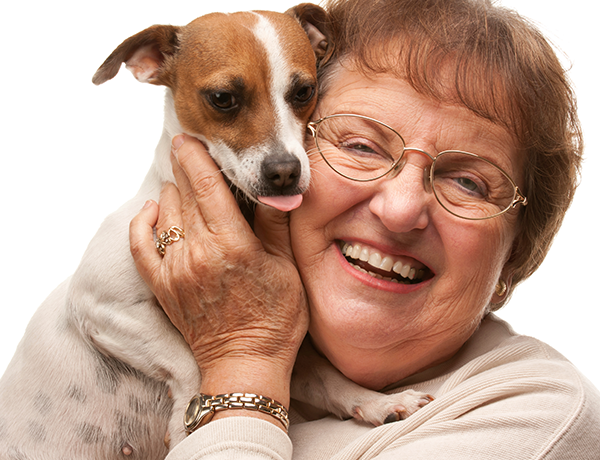 Pet ownership has been shown to have numerous benefits for emotional health and quality of life, especially in seniors. However, having a pet in the household can pose disadvantages and dangers that are also important to consider.
Pet ownership has been shown to have numerous benefits for emotional health and quality of life, especially in seniors. However, having a pet in the household can pose disadvantages and dangers that are also important to consider.
Whether you or your loved one already has a trusty animal companion, or is merely considering bringing a pet into the home, adoption and caretaking decisions should always be carefully weighed. Read on to explore the risks and rewards of pet ownership for seniors, and learn how expert help and advice from an in-home occupational therapist can help ensure that the experience is a happy one.
REWARD: Better Overall Health
Pets require daily attention and exercise, which can encourage older adults to be more physically active than they might be otherwise. Additionally, the routine that comes with pet care can be a welcome source of structure and purpose.
RISK: Demands of Care
Feeding, walking, and cleaning up after a pet is no easy task — it can be trying even for younger adults. For seniors, who may have limited mobility or deficits in memory or cognition, the duties that come with pet ownership can be a source of anxiety. If an animal’s energy levels or needs are greater than its owner can keep up with, the drawbacks of pet ownership can start to outweigh the positives.
REWARD: Emotional Uplift and Companionship
Older adults can be vulnerable to stress, anxiety, and depression. Focusing on caring for pets can be a distraction from dwelling on financial uncertainty, health issues, family drama, or other sources of emotional distress. An animal companion can also ease feelings of solitude for seniors who may not have as many social opportunities or visitors as they would prefer.
RISK: Potential for Injury
The elderly are at increased risk for falls and associated injuries, such as bone fractures. Toys strewn about, or a small animal moving underfoot, represent major hazards, especially for seniors who are contending with low vision and/or limited balance — they may not be able to see a pet, or maneuver to avoid it. The controlled motions of stooping, reaching, and lifting also lose predictability when handling a live animal.
A Skillful Step toward Household Harmony
To keep pets from becoming a source of anxiety and risk, instead of companionship and affection, an in-home occupational therapist can help seniors to lessen their home hazards and manage the tasks and responsibilities of pet ownership. During a home visit, an occupational therapist can identify difficulties and dangers in a senior’s home and routine, and offer solutions to improve efficiency and safety. For seniors who want to adopt an animal companion, or who would like to better manage the pets they already have, the personalized assistance of an in-home occupational therapist can help tip the balance toward a fulfilling, safer pet experience.
Contact us to discuss your specific situation with a Residential Home Health Home Care Specialist today, and see if in-home occupational therapy or other home care services may benefit you or your loved one.

